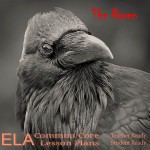I had just taught some great “The Raven” lesson plans and felt pretty good about myself, so good in fact, that I grew a Poe-like mustache and began wandering the halls during my prep with a giant black bird on my shoulder.

This teaching guide for “The Raven” includes lesson plans, graphic organizers with answer keys, a summary, analysis, a quiz with answer keys, an essay rubric, and more.
It was an actual raven that only spoke one phrase: “”The Raven” lesson plans from the master teacher available here.”
Then I read some of the essays generated by my “The Raven” lesson plans. The essays were terrible. I had left out the lesson about writing a literary criticism of “The Raven” and the essays contained no direct citations from the poem.
I immediately wrung the birds neck and walled it up next to my vault of ungraded papers from the 1990s. I then whipped up these quotes for writing a literary criticism of “The Raven” and made them part of my “The Raven” lesson plans collections.
Quotes for Writing a Literary Criticism of “The Raven.”
Quote: “Once upon a midnight dreary, while I pondered, weak and weary,
Over many a quaint and curious volume of forgotten lore,
While I nodded, nearly napping…” (1-3)
Analysis: And so begins one of the most famous poems by one of the world’s most famous poets. These first three lines establish the unreliability of the narrator and his tale of a supernatural bird.
The time is midnight. The state of the narrator is weak, weary, and nearly napping. The narrator is reading folklore.
It is, therefore, quite possible that the narrator dreams this entire scene. The narrator’s sanity can also be called into question as he suffers from depression due to the loss of Lenore.
 Quote: Thrilled me—filled me with fantastic terrors never felt before…” (14)
Quote: Thrilled me—filled me with fantastic terrors never felt before…” (14)
Analysis: Think of things that might fill you with “fantastic terrors never felt before.”
Perhaps you thought of swimming in a pool and having a glass plate slide over the top of it while you’re underwater? Maybe you’re hiking in the mountains and you come across a Grizzly Bear a rabid Barney the Dinosaur? Perhaps you’re on a ladder and it starts to sway back and forth as you approach the top? All legitimate occurrences that might fill you with terror.
And what fills the narrator with terror? A rustling curtain. I think it’s fair to question the narrator’s mental state and, by association, the veracity of his tale.
 Quote: “Quoth the Raven “Nevermore.” ” (48)
Quote: “Quoth the Raven “Nevermore.” ” (48)
Analysi: The raven, by talking, seems to posses supernatural powers.
The period of American Romanticism sheds light on Poe’s fascination with death and the supernatural. Understanding American Romanticism, by the way, would be critical in writing a literary criticism of “The Raven.”
Once again, the question remains, did the raven really talk or did those “tales of forgotten lore” make a deep impression on the narrator’s mind and soul right before he nodded off?
 Quote: “Then, methought, the air grew denser, perfumed from an unseen censer
Quote: “Then, methought, the air grew denser, perfumed from an unseen censer
Swung by Seraphim whose foot-falls tinkled on the tufted floor.” (79-80)
Analysis: In addition to being a masterful example of sound devices in poetry, this particular line adds to the ambiguity of the narrator’s tale. If, in fact, “the air grew denser, perfumed from an unseen censer,” then the likelihood of a supernatural raven increases.
Keep in mind, however, that not even the narrator is sure this happens. He only thinks this happens.
 Quote: “And the only word there spoken was the whispered word, “Lenore?”
Quote: “And the only word there spoken was the whispered word, “Lenore?”
This I whispered, and an echo murmured back the word, “Lenore!” ” (28-29)
Analysis: This seems like kind of a strange word to whisper in the dead of night. The narrator soon reveals that Lenore was someone he loved and lost.
How did the bird know about Lenore? Either it’s a supernatural fowl or the narrator so depressed and lonely, he sees and hears Lenore everywhere.
 Quote: “Quaff, oh quaff this kind nepenthe and forget this lost Lenore!” (82)
Quote: “Quaff, oh quaff this kind nepenthe and forget this lost Lenore!” (82)
Analysis: When love gives way to despair, men often take to strong drink. Nepenthe is a mythical potion that makes the drinker forget his pain.
Nepenthe could also be symbolic of alcohol. Is this the first drink the narrator has taken this evening?
In light of the narrator’s depression, it may also be an allusion to suicide.
Last Updated on March 12, 2018 by Trenton Lorcher
Share This:
This post is really interesting. I have bookmarked it.
Do you allow guest posting on your website ? I can provide
high quality articles for you. Let me know.
Thanks Arlen. I’ve never really considered guest posting since I’m not sure exactly how it would benefit the guest. If there’s a way we could make it beneficial–perhaps a blog post exchange–I’d be open to it. Shoot me an email @ [email protected].